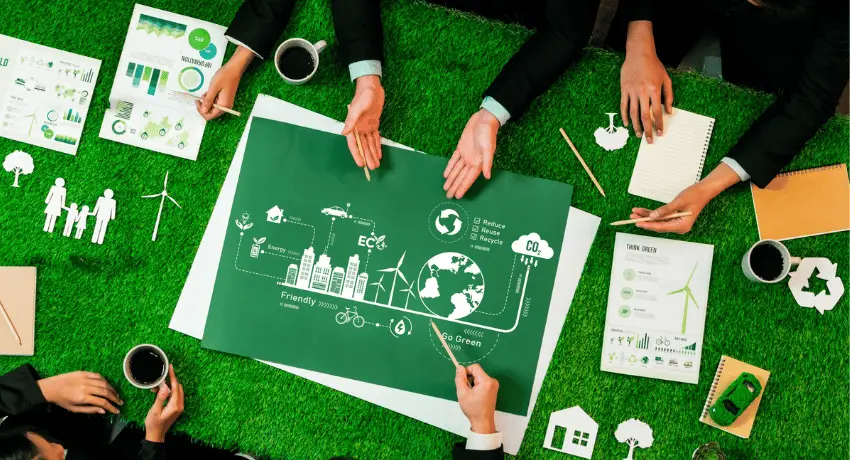The Future of Sustainable Business
Sustainability is no longer a buzzword; it’s a critical component of the global business landscape. As the world faces unprecedented environmental and social challenges, the future of sustainable business is evolving rapidly. Companies that embrace sustainable practices are not only future-proofing themselves but also driving innovation, reducing costs, and creating value for society and the planet.
Why Sustainability is the Future
The traditional model of business—focused solely on profit—is giving way to a more balanced approach that considers the triple bottom line: people, planet, and profit. This shift is being driven by several factors:
- Consumer Demand: Today’s consumers are more informed and conscious about the environmental and social impacts of their purchases. They are choosing brands that align with their values.
- Regulatory Pressure: Governments worldwide are introducing stricter environmental laws and sustainability mandates, pushing businesses to adapt.
- Investor Focus: Investors are prioritizing Environmental, Social, and Governance (ESG) metrics, making sustainability a key factor in funding and valuation.
- Climate Crisis: With climate change posing an existential threat, businesses are being compelled to reduce their carbon footprint and adopt renewable energy solutions.
Key Trends Shaping Sustainable Business
- Circular Economy Models: Businesses are rethinking waste by adopting circular economy principles. From recycling materials to designing products that can be reused or repurposed, companies are minimizing waste and maximizing resource efficiency.
- Renewable Energy Adoption: The transition from fossil fuels to renewable energy sources like solar, wind, and biogas is accelerating. Companies are not only reducing operational costs but also contributing to energy independence and lower emissions.
- Green Supply Chains: Sustainable sourcing, efficient logistics, and ethical labor practices are becoming standard for supply chains. Businesses are auditing their entire value chain to ensure sustainability at every step.
- Technological Innovations: Advancements in artificial intelligence, blockchain, and IoT are enabling businesses to optimize resources, monitor sustainability metrics, and enhance transparency.
- Employee Engagement: Companies are fostering a culture of sustainability among their employees, empowering them to contribute to greener initiatives both at work and in their personal lives.
How Businesses Can Lead the Way
- Set Clear Goals: Establish measurable sustainability goals aligned with global frameworks like the UN Sustainable Development Goals (SDGs).
- Invest in Renewable Energy: Transitioning to clean energy sources reduces both costs and emissions. At Green Vikalp LLP, we specialize in providing biogas solutions that transform waste into renewable energy, enabling businesses to become energy independent.
- Collaborate and Partner: Work with governments, NGOs, and industry peers to share best practices and drive collective impact.
- Educate Stakeholders: Raise awareness among employees, customers, and suppliers about the importance of sustainability and how they can contribute.
- Leverage Technology: Utilize data analytics, AI, and automation to monitor and optimize sustainability efforts in real time.
Benefits of Sustainable Business Practices
- Cost Savings: Reducing energy consumption, waste, and resource use leads to significant cost reductions.
- Brand Loyalty: Companies that prioritize sustainability build trust and loyalty among eco-conscious consumers.
- Resilience: Sustainable businesses are better equipped to adapt to regulatory changes, resource scarcity, and market shifts.
- Innovation: Sustainability challenges often inspire innovative solutions and new business models.
Green Vikalp LLP: Empowering Sustainable Businesses
At Green Vikalp LLP, we are committed to helping businesses transition to sustainable practices. Through our biogas solutions, we enable companies to turn waste into opportunity, reduce their carbon footprint, and contribute to a circular economy. By aligning with India’s SATAT initiative and promoting renewable energy, we aim to lead the charge in creating a sustainable future for industries and communities.
The Time to Act is Now
The future of sustainable business is not just about surviving—it’s about thriving in a world that demands environmental and social responsibility. Companies that take bold steps today will reap the rewards of resilience, innovation, and growth tomorrow. By embracing sustainability, businesses can secure a prosperous future for themselves and the generations to come.
Let’s build a future where profitability and sustainability go hand in hand. Together, we can create a world where businesses are a force for good, driving progress and preserving the planet for future generations.
